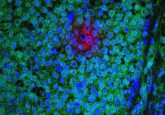POLQ inhibitors: a novel drug class that could treat a range of BRCA-mutant cancers

Researchers from the Institute of Cancer Research (ICR; London, UK) are pioneering a novel drug class – POLQ inhibitors – for the treatment of BRCA-mutant tumors, particularly breast cancer. POLQ inhibitors target the DNA damage response pathway and evidence suggests that there is both a high synergy with PARP inhibitors and a possibility of overcoming acquired resistance.
The recent study, published in Nature Communications and funded by Artios (Cambridge, UK), Cancer Research UK and Breast Cancer Now, describes preclinical research from the ICR exploring the potential of using POLQ inhibitors in treating cancer cells with defects in BRCA genes. Their in-vivo data suggests the novel drug class has high specificity and, crucially, can kill cancer cells that have become resistant to PARP inhibitors.
POLQ is involved in DNA damage response and it has been known for some time that genetically removing POLQ in BRCA-mutant tumors triggers programmed cell death or apoptosis. Cells can survive with functional copies of either BRCA or POLQ so specific inhibition in BRCA-mutant tumors has proved to be highly specific in the laboratory.
Researchers found that POLQ inhibitors work very well when used together in combination with PARP inhibitors; the addition of which meant that PARP inhibitors were effective when used at a lower dose. Furthermore, using both rat models and organoids, researchers demonstrated that POLQ inhibitors were able to shrink BRCA-mutant cancers that had stopped responding to PARP inhibitors because of a defect in a set of genes known as shieldins.
You may also like:
- PARP inhibitors: study uncovers novel mechanism of action
- OlympiA trial results show olaparib improves disease-free survival in high-risk, early-stage HER2-negative breast cancer with BRCA 1/2 mutations
- Top 5 Future Oncology articles – June 2021
This suggests that POLQ inhibitors could offer an alternative treatment where PARP inhibitors are no longer working. Better still, the ICR team believe that using a POLQ inhibitor in combination with a PARP inhibitor in patients with cancers that have faulty BRCA genes could prevent resistance from emerging in the first place.
The study is progressing to clinical trials to test this novel drug class and, if successful, POLQ inhibitors could enter the clinic as a new approach to treating a range of cancers with BRCA mutations, including ovarian, prostate and breast cancer.
“It’s exciting that the new POLQ inhibitors should provide a different approach to treating cancers with BRCA gene defects – and particularly that this class of drugs should retain their activity in cancers that have developed resistance to PARP inhibitors. Most exciting of all is the potential of combining POLQ and PARP inhibitor drugs to prevent the evolution of BRCA-mutant cancers into more aggressive, drug-resistant forms – a major challenge that we see in the clinic,” explained Paul Workman, Chief Executive of the ICR.
Michelle Mitchell, Chief Executive at Cancer Research UK, continued with “More than 25 years ago we helped discover the BRCA gene, which spurred on our scientists to work with others to develop PARP inhibitors, which are now benefiting many patients. But we are always trying to find newer and better ways to outstep cancer, especially when it stops responding to current treatments.”
“By revisiting weaknesses in the BRCA repair pathway, researchers have not only found a way to make PARP inhibitors more effective, but they may have also identified an entirely new class of targeted drugs for BRCA cancers, which could include pancreatic cancer which has limited treated options.”
“By revisiting weaknesses in the BRCA repair pathway, researchers have not only found a way to make PARP inhibitors more effective, but they may have also identified an entirely new class of targeted drugs for BRCA cancers, which could include pancreatic cancer which has limited treated options. We look forward to seeing if these promising results in the lab transfer into benefits for patients when tested in trials.”
Source: www.icr.ac.uk/news-archive/new-drug-class-could-treat-range-of-cancers-with-faulty-brca-genes





